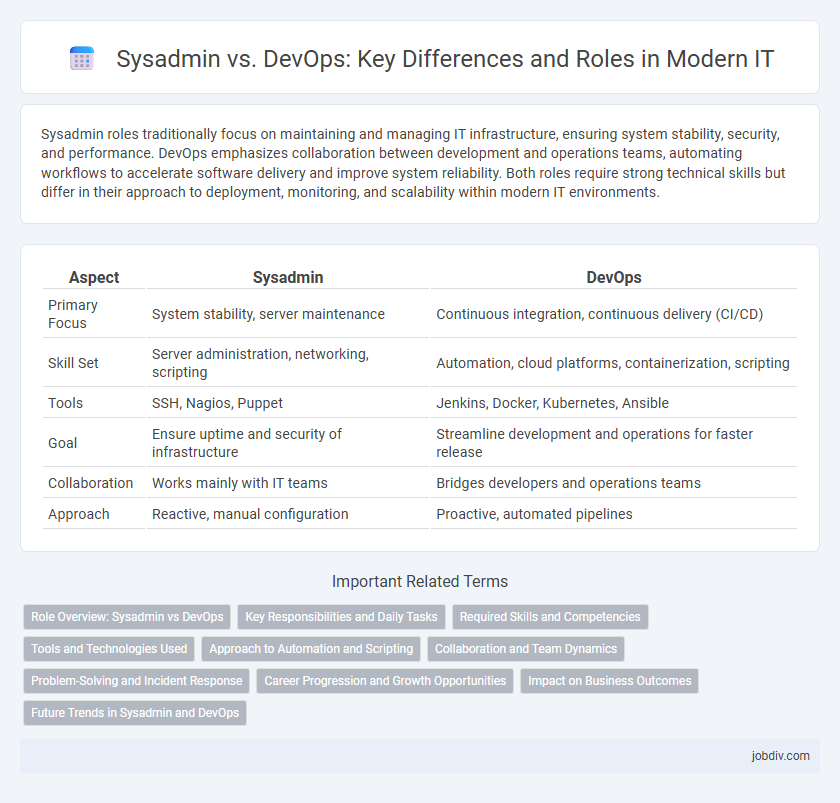Sysadmin roles traditionally focus on maintaining and managing IT infrastructure, ensuring system stability, security, and performance. DevOps emphasizes collaboration between development and operations teams, automating workflows to accelerate software delivery and improve system reliability. Both roles require strong technical skills but differ in their approach to deployment, monitoring, and scalability within modern IT environments.
Table of Comparison
| Aspect | Sysadmin | DevOps |
|---|---|---|
| Primary Focus | System stability, server maintenance | Continuous integration, continuous delivery (CI/CD) |
| Skill Set | Server administration, networking, scripting | Automation, cloud platforms, containerization, scripting |
| Tools | SSH, Nagios, Puppet | Jenkins, Docker, Kubernetes, Ansible |
| Goal | Ensure uptime and security of infrastructure | Streamline development and operations for faster release |
| Collaboration | Works mainly with IT teams | Bridges developers and operations teams |
| Approach | Reactive, manual configuration | Proactive, automated pipelines |
Role Overview: Sysadmin vs DevOps
System administrators manage and maintain IT infrastructure, ensuring server stability, network security, and hardware-software integration. DevOps engineers streamline software development and operations by automating deployments, monitoring system performance, and fostering collaboration between development and IT teams. Both roles emphasize system reliability, but DevOps integrates continuous delivery and agile practices for faster innovation cycles.
Key Responsibilities and Daily Tasks
Sysadmins primarily manage and maintain IT infrastructure by handling server configuration, network monitoring, and system backups to ensure stability and security. DevOps engineers focus on automating deployment pipelines, integrating continuous integration/continuous delivery (CI/CD) tools, and collaborating with development teams to streamline software releases. Both roles require proficiency in scripting and system troubleshooting, but DevOps emphasizes automation and collaboration to accelerate development cycles.
Required Skills and Competencies
Sysadmins require strong expertise in system administration, network configuration, infrastructure maintenance, and troubleshooting with proficiency in Linux and Windows server environments. DevOps professionals emphasize skills in automation tools like Jenkins, Docker, and Kubernetes, along with continuous integration/continuous deployment (CI/CD) pipelines and cloud platforms such as AWS, Azure, or Google Cloud. Both roles demand scripting knowledge, but DevOps leans heavily on software development practices and collaboration between development and operations teams.
Tools and Technologies Used
Sysadmins primarily rely on traditional tools like shell scripting, configuration management software such as Puppet and Ansible, and monitoring solutions like Nagios and Zabbix to maintain system stability. DevOps engineers integrate modern CI/CD platforms including Jenkins, GitLab CI, and container orchestration technologies like Kubernetes and Docker to streamline development and deployment processes. Both roles leverage cloud services from AWS, Azure, or Google Cloud, but DevOps emphasizes automation and infrastructure as code using tools like Terraform and Chef.
Approach to Automation and Scripting
Sysadmins traditionally rely on manual scripting and automation tools like Bash or PowerShell to manage infrastructure and ensure stability, focusing on predefined tasks and reactive troubleshooting. DevOps engineers implement automation through continuous integration/continuous deployment (CI/CD) pipelines using tools such as Jenkins, Ansible, and Terraform, enabling proactive infrastructure management and rapid application delivery. This shift toward infrastructure as code and automated workflows distinguishes DevOps' approach from sysadmins' more manual, system-focused scripting methods.
Collaboration and Team Dynamics
Sysadmins and DevOps engineers play distinct but complementary roles in technology teams, with sysadmins focusing on maintaining infrastructure stability and DevOps facilitating automation and continuous integration. Effective collaboration hinges on integrating sysadmin expertise in system reliability with DevOps practices that accelerate deployment cycles. Emphasizing shared responsibilities and open communication improves team dynamics, driving innovation and operational efficiency.
Problem-Solving and Incident Response
Sysadmins excel in maintaining system stability through routine monitoring and rapid problem-solving focused on infrastructure issues, ensuring minimal downtime. DevOps professionals integrate automation tools and continuous deployment practices to identify and resolve incidents faster, improving system resilience and scalability. Both roles emphasize proactive incident response, but DevOps prioritizes collaboration across development and operations for holistic problem resolution.
Career Progression and Growth Opportunities
Sysadmin roles focus on maintaining and optimizing IT infrastructure, offering growth through expertise in system administration, network management, and security, which can lead to senior sysadmin or IT operations manager positions. DevOps careers emphasize automation, continuous integration, and collaboration between development and operations, providing advancement opportunities into DevOps engineer, site reliability engineer (SRE), or cloud architect roles. The DevOps path often presents faster career growth due to high demand for skills in CI/CD pipelines, containerization, and cloud services like AWS, Azure, and Kubernetes.
Impact on Business Outcomes
Sysadmin roles traditionally focus on maintaining IT infrastructure, ensuring system stability and uptime, which directly supports consistent business operations and reduces downtime costs. DevOps practices enhance collaboration between development and operations teams, accelerating software delivery, improving deployment frequency, and enabling faster time-to-market, thereby driving higher revenue growth and customer satisfaction. Implementing DevOps can lead to significant improvements in innovation velocity and operational efficiency compared to conventional sysadmin approaches.
Future Trends in Sysadmin and DevOps
Future trends in Sysadmin and DevOps emphasize automation, cloud-native infrastructure, and AI-driven monitoring to enhance system reliability and scalability. Infrastructure as Code (IaC) and container orchestration platforms like Kubernetes are becoming standard to streamline deployment and management workflows. The integration of machine learning for predictive analytics is transforming incident response, making proactive system maintenance more efficient.
Sysadmin vs DevOps Infographic

 jobdiv.com
jobdiv.com